
Vatican City, Oct 27, 2017 / 03:04 am (CNA/EWTN News).- Ahead of a Vatican conference exploring the future of the European Union, several ambassadors to the Holy See have said the event is a prime opportunity to share ideas with those who are beyond their usual circles.
And the Church, they said, is in a unique position to speak on major issues, offering key insights from which many global leaders could benefit.
Hungary’s Ambassador to the Holy See, Eduard Habsburg, told CNA that when exploring the current challenges that Europe is facing, it’s important to recognize that there are different visions, “but that they are reconcilable, and that if you speak to each other you can march in a good direction.”
“I think the greatest enemy of Europe is the idea that everybody agrees on everything which is just one vision. It doesn’t work like that,” he said. “We’re a big family with many different members who sort-of agree on a general direction, but who may sometimes have different opinions on things.”
Habsburg, who will be leading an Italian-language group during the conference, said he is looking forward to the discussion because “it’s not going to be the usual people together; they are really going to mix (it up) so that you sit with people you don’t usually meet.”
Because of this “there’s no danger that everybody pats each other on the back in mutual agreement on everything, but you are really going to be exposed to different ideas and different geographic regions, and that’s a very, very exciting prospect,” he said.
Added to this is the desire to more intentionally involve the voice of the Church, which is organizing the event. So another key goal, then, is “to bring Church people into contact with E.U. people to engage the Church more into E.U. business and topics.”
In comments to CNA, Irish Ambassador to the Holy See Emma Madigan said that given this year’s celebration of the 60th anniversary of the Treaties of Rome that established the E.U., “we want as many voices as possible involved in the future of Europe.”
“Europe is only strengthened by the engagement of thoughtful people, hearing their concerns and their criticism and their hopes,” she said.
The conference is an opportunity “for a broader and a deeper exchange of views among people of great experience and insight,” Madigan said, voicing her belief that the event “will benefit both from the different perspectives the participants will bring, but also the common ground they share in terms of the global challenges they identify and the fundamental values of dialogue, cooperation and inclusion.”
Titled “(Re)Thinking Europe: A Christian Contribution to the Future of the European Project,” the conference takes place in Rome Oct. 27-29, and will gather together hundreds of high-level Church and E.U. political leaders.
It is being organized by the Commission of the Bishops’ Conferences of the European Community in partnership with the Holy See, and will draw hundreds of civil and ecclesial leaders from across Europe and the E.U. to offer a constructive reflection on the challenges facing Europe.
Rather than an official congress with a formal concluding declaration, the event will be more of a frank discussion between the various stakeholders, as well as an opportunity to for the different parties to exchange ideas and opinions.
Some 350 participants from 28 delegations representing all E.U. countries are slated to attend, including high-level E.U. politicians and Catholic hierarchy, academics, ambassadors, representatives of different Catholic organizations and movements, as well as from other Christian delegations.
Vatican Secretary of State Cardinal Pietro Parolin will open the conference with a keynote speech Friday, and his address will be followed by a speech from former President of the European Parliament Pat Cox on the “crossroads” at which Europe currently stands.
From there, discussion will dive into topics such as the state of democracy in Europe and how to build bridges among the various E.U. member-states, as well as what kind of economy is best for Europe amid a changing world.
On Saturday, various ambassadors to the Holy See will chair discussion groups divided by language, so the various interlocutors can meet and exchange ideas with representatives from different countries and organizations, both civil and ecclesial.
The conference will close with an audience with Pope Francis, who throughout his pontificate has been outspoken about his vision for Europe, including the need to “rediscover” the Christian roots of the continent and to find new, innovative and creative solutions to modern problems.
Habsburg said he is happy to see the bishops organizing the event, and that from the words the Pope has spoken, it’s obvious that Francis “really cares about Europe, and the E.U.”
“I was present at the E.U. 60th anniversary meeting in Rome, and you could feel that he really cares about Europe and tries to engage in a dialogue,” he said.
As far as the conference and the role of Church leaders in shaping the future of the E.U., Habsburg said he believes the event was organized in part because the Holy See wants to “sensitize the local bishops conferences to E.U. topics in order to help governments.”
“My interpretation is that the Pope wants to expose Church members from different European states to major E.U. issues and make them a partner in the discussion,” he said. And coupled with this is also the fact that “one doesn’t want religion to be pushed out of political talk and everyday reality in the E.U.”
“I’m very happy that this comes from the bishops,” he said, adding that “perhaps sometimes, through all the hectic everyday politics, you need those moments where you can sit back and look at the greater picture.”
In comments to CNA, British Ambassador to the Holy See Sally Axworthy noted that Pope Francis continually encourages “both the Church and governments to respond to the challenges that they see around them with compassion for the vulnerable and a strong sense of our values.”
“We support him in that,” she said, adding that the British government also welcomes the fact that European bishops and Church leaders want to contribute to the discussion on the future of Europe.
“It is important that the religious perspective on Europe’s future direction is heard,” she said.
Similarly, Madigan noted that Pope Francis’ words about Europe have been strong, and that he has always sought “to challenge European leaders to create the best version of Europe they possibly can.”
Madigan, who has been Ireland’s ambassador to the Holy See since 2014, pointed to what she has perceived as a “subtle development” in the Pope’s approach to Europe the past few years, continuing to challenge, but with greater focus on “the extent to which Europe exemplifies values that should be more prevalent in the world than they are – peace, democracy, dialogue, cooperation and respect for human dignity and freedom.”
French Ambassador to the Holy See Philippe Zeller also commented on the poignancy of the Pope’s message on Europe, particularly in his recent speeches.
Also pointing to the subtle change in the tone used by Pope Francis – who during his visit to Strasbourg in 2014 told E.U. leaders that a “grandmother Europe” needed to move beyond “outdated” systems, but in March was much more keen in highlighting the potential that Europe has for the future – Zeller said the March speech especially “was very well received,” particularly the reference to Europe’s roots.
Noting how in his March speech Francis pointed out that the six “founding fathers” of the E.U. “were all engaged in, in a personal view of course, the Catholic religion, in Christianity,” Zeller said that to present this view is “very important right now,” as Europe is re-thinking its identity.
Both Zeller and Habsburg stressed the importance of remembering Europe’s Christian roots.
It’s crucial to introduce ideas based on “common heritage, on cultural roots,” Zeller said, and voiced his excitement at having the opportunity for leaders and politicians to have an open discussion about Europe, “which actually is not doing very well.”
“The E.U. faces real and difficult challenges now,” he said, so the idea of having a meeting among the episcopal conferences in Europe as well as political leaders is “very interesting and we are happy as European ambassadors to the Holy See to be associated and to share the views of these different conferences.”
Likewise, Habsburg said he believes that for Europe truly to advance, it must “go back to core values, and some of those core values, in my opinion, are the Christian roots of Europe.”
Both family and solidarity are two key values that need to be re-emphasized today, he said, adding that there has to be a careful balance “between doing things together and having a healthy respect of the differences.”
In terms of the message each country wants to bring to the discussion table, Madigan, Habsburg, and Zeller all voiced their desire to both share their own local experience on key issues, and to listen.
For France, Zeller said their new president, Emmanuel Macron, has a lot of ideas on the challenges Europe faces, including security and defense policies, economic and business policies, as well as the desire to reduce unemployment and increase trade opportunities.
“It’s interesting for us to see that those ideas presented by our new president and government could be shared or could trigger some ideas” within the E.U., he said, and pointed to what he believes is a need to “re-introduce this aspect of common values.”
As for Ireland, which in many ways is facing a heightened sense of national uncertainty following the 2016 Brexit vote, Madigan noted that almost immediately after the result of the UK referendum was known, members of the E.U.27 met in Bratislava, where they recognized that “the E.U. is not perfect but it is the best instrument we have for addressing the new challenges we are facing.”
Looking forward, Madigan said the future of the E.U. “is inseparable from the future of the world,” and that as such, members must adapt to the new challenges faced not only on the continent, but throughout the world.
Europe is and must be “much more than a debate on institutions,” she said. Rather, “it is about achieving outcomes for all our citizens and the expression of our values in the world.”
Voicing his hopes for the outcome of the conference, Habsburg said his biggest desire is that “we should not talk so much about each other, but talk with each other, and most of all listen to each other.”
“I have the impression that some countries which are at times being perceived as being very critical of Europe or even rebellious, often only have wishes that could somehow also further the common European cause, but are often not listened to or are often drowned in lots of political narratives,” he said.
However, during the conference everyone will be able to speak up about their own ideas and visions of Europe, he said, explaining that discussion groups will focus largely on questions such as “what is your idea about the path of Europe in your part of the world? What are you dreams? Where could we go? What do we have in common?”
“It’s a real serious stopping, sitting down together and talking, and I think Europe really needs that now,” he said. And while heads of state meet with regularity, the conference is unique in that so many people from different levels of both Church and state will attend and share ideas.
“So it’s really going to be a very interesting experience,” he said. “I think this conference is an incredible sign of hope.”
Hannah Brockhaus contributed to this report.
 […]
[…]

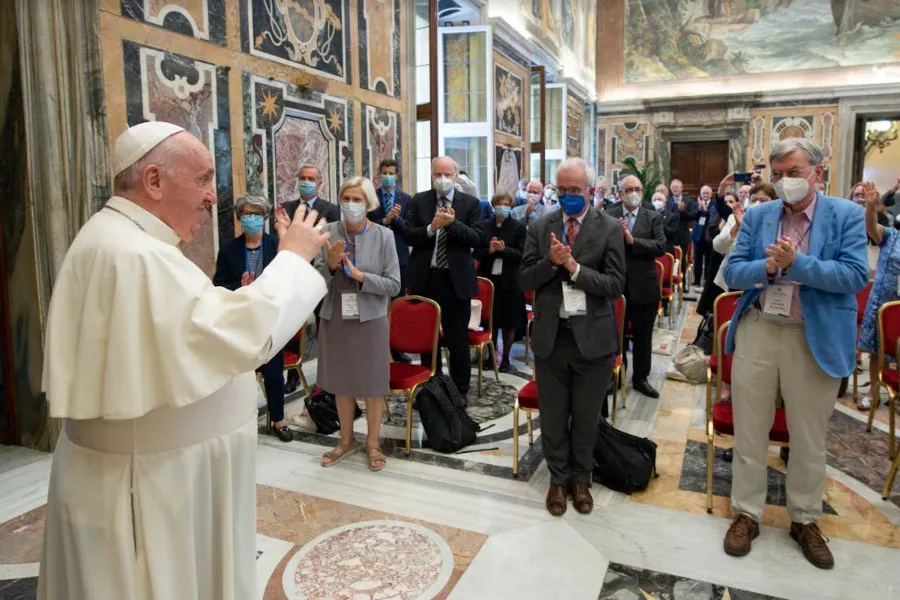
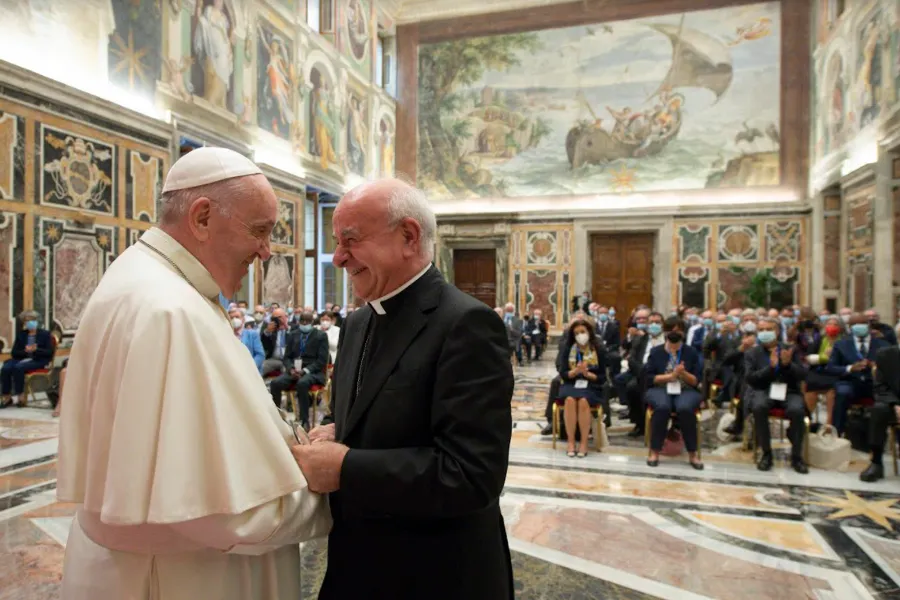
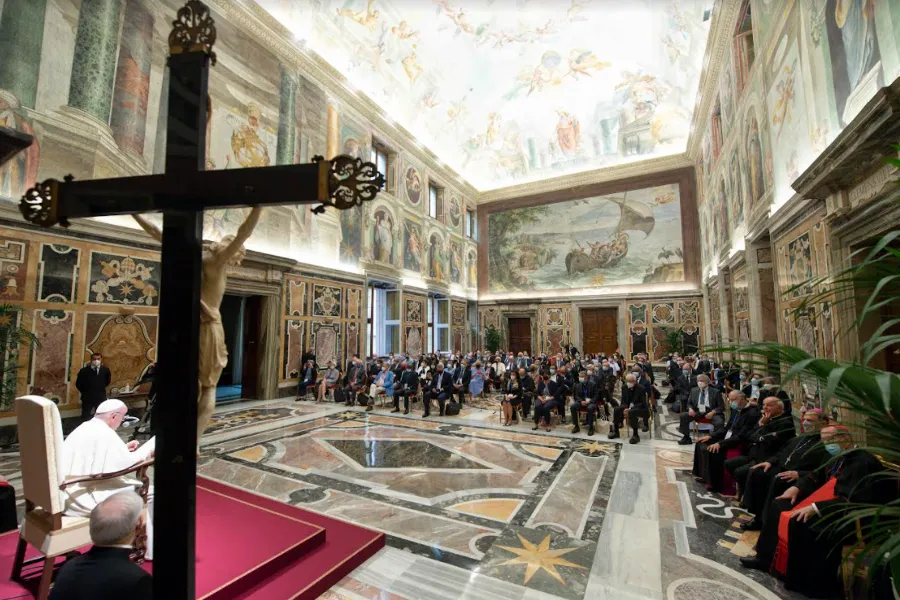
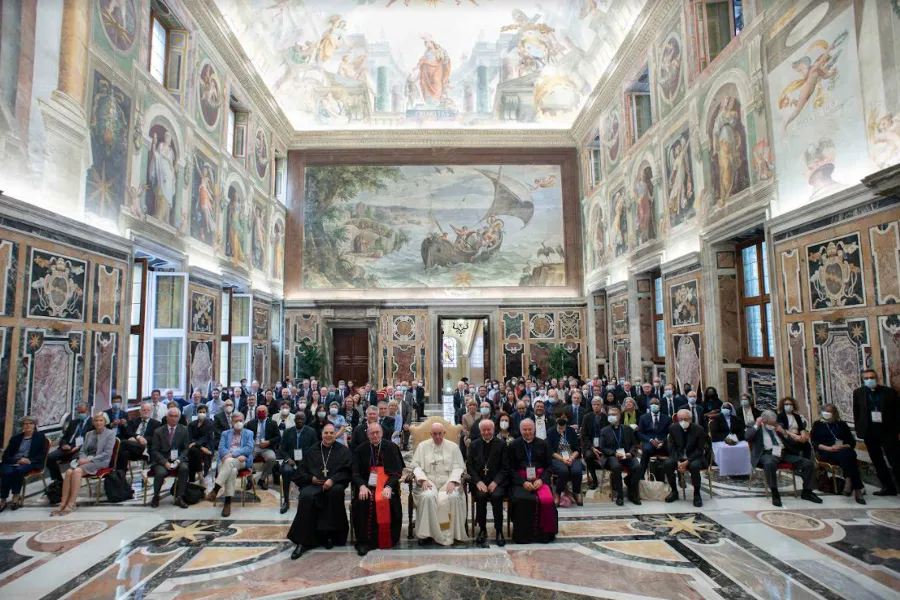
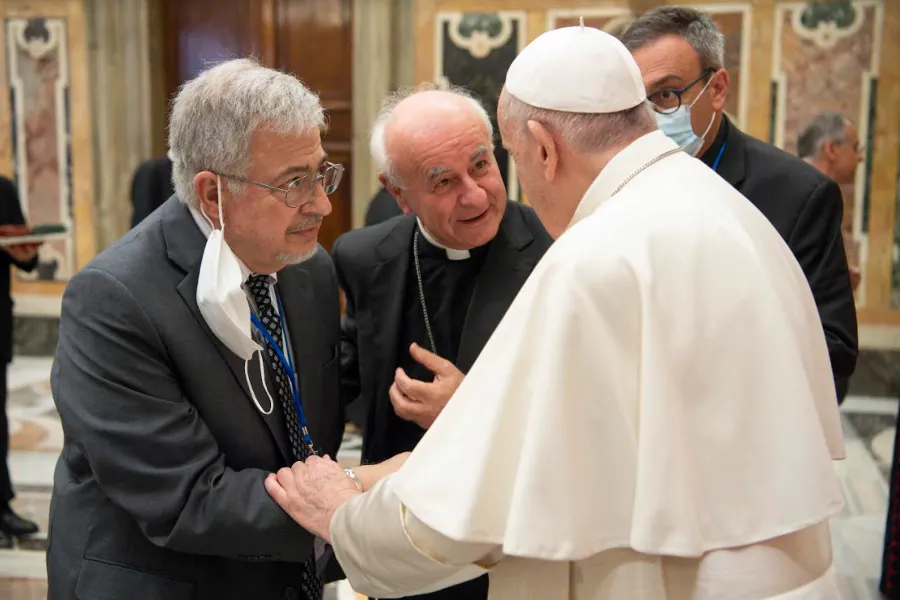
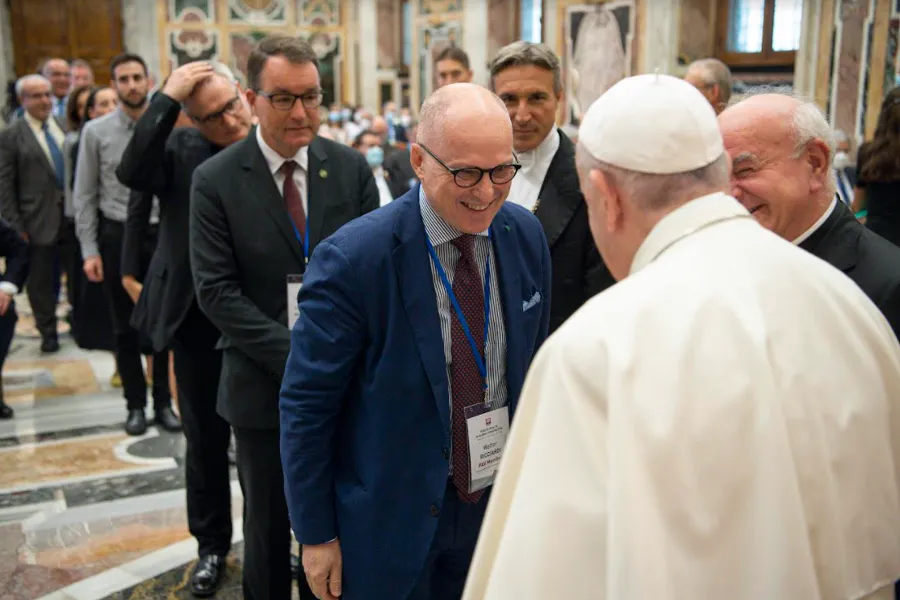







Catholic faithful welcome the strong words, although many do not perceive actions that support such strenuous condemnation. Many of us remain unconvinced. For example, real, live hitmen, Mafia members, in fact all Mafia members were excommunicated by Pope Francis. Then why the withholding of excommunication from Catholic politicians who applaud and legalize government legislation and financial support for abortion, the support for hitmen Planned Parenthood and the like? Why does the Pontiff discourage Catholic prelates who do wish to sanction these politicians? And approve of Archbishop Paglia’s appointment of pro abortion Anglican theologian Nigel Biggar to the Pontifical Academy for Life?. A policy of words sans action that obviously encourages the Catholic laity to vote largely in favor of pro abortion Catholic politicians? If we measure the crime by numbers the aborted infants are infinitely more the victims of murder than Mafia victims. Parity in words doesn’t equate parity in belief, if belief really means to live exactly as we say we believe. Otherwise it’s a lie.
Hope and pray that the Pope’s strong words will further lead him to follow-up with the required strong action in his administration to clean up the Church.
Finally, the Pope is speaking more and more against abortion, and ever more vigorously.
Would that he had done that in the first years of his papacy!!!
The Pope has condemned abortion quite often over the years. I believe that in the early years he might have had a lot of learning to do as a new Pope who had moved in from Argentina.
Mal, re remained silent during the Irish Referendum citing non-interference in internal country affairs. The result was that Catholics perceived he tacitly approved. Then during the US election he openly supported pro-abortion Joe over… interfering and this time with non-tacit approval. Does this resemble honest behavior from a pope, or double-speak from a Free Mason who has a public program but a “hidden” agenda?
Can you prove that our Pope, who is a faithful Catholic and disciple of our Lord, was a freemason? I have seen many such obviously false accusations being made against Pope Francis, and even the Popes before him, and these accusations are kept alive by those who hate Pope Francis.
Catholic faithful welcome the strong words, although many do not perceive actions that support condemnation. Many of us remain unconvinced. For example, Mafia hitmen, indeed all Mafia members were excommunicated by Pope Francis. Then why withhold instruction of the latae sententiae applicability of canon 915 to all Catholic politicians who support even seek to extend abortion? Why does the Pontiff discourage Catholic prelates who do wish to sanction these politicians? And approve of Archbishop Paglia’s appointment of pro abortion Anglican theologian Nigel Biggar to the Pontifical Academy for Life?. A policy of words and no follow-up, except actions that seem to support abortion policy encourage Catholic laity to dismiss doctrine and vote largely in favor of pro abortion Catholic politicians. Parity in words doesn’t equate parity in belief, if belief really means to live exactly as we say we believe.
Pray for wisdom for our Pope that he sees and performs the necessary action to be consistent with his words, and rids the Church of all elements and politicians who support abortion. Give them a chance to renounce abortion and repent. If they do not repent, then they are not Catholics in communion with the Church and, therefore, are not worthy of the Eucharist.
Agreed Ron. I do pray for a just resolution that benefits all.
This second like comment was meant to replace the one above. Ah well, double for the effort. On topic is the challenge of aging and death. Aging is not for the faint of heart (from Thurman Ray Plumlee who wrote Growing Old is Not for the Faint of Heart). Elective euthanasia the easy way out except for judgment and more suffering. Although the pontiff sounds good on the air here, he doesn’t on paper elsewhere. Amoris Laetitia provides the rationale for political expediency based on difficult concrete situations and the primacy of conscience. Moderation, the mitigation of religious rules for sake of societal pluralism. If adultery can be moderately assessed as acceptable why not abortion for the Catholic politician? There is in this an enticing fallacy that subverts [all] revealed moral truth, a religious faux pas. An indiscretion that omits reference to grace, also identified by others in Ch 8. Grace given by Christ exactly to remain faithful within life’s difficult concrete situations. As to growing old I like to look at it other than the cliché a soul trapped in a dying body. Rather an increasingly fine, aging wine ready to be decanted.
It would be interesting to see this latest declaration from the Pope put side by side with another papal soundbite: “I have never refused the Eucharist to anyone.” Let’s wait for the USCCB document coming out this November and check on which one of these statements they will focus their spotlight on or will they give weigh to both? I can’t wait. Even CWR, the rest of the rightist conservative Catholic media, and their constituents, can be weighed in this aspect of their coverage and emphasis of papal tweetable statements to determine their Catholicity, biases, and partisanship.
This is very good news.
(Why is it that with this prelate I am always waiting for the other shoe to drop?)
Those throwaway parts did not go to waste but were in fact essential in the development of the covax
Also euthanasia may one day be our best protection against covid and therefore at that time an ‘act of love’
It’s all coming up roses
Thin gruel.
“treating human life like waste…” Just as Bergoglio did by selling out the Chinese Catholics to their tormentors. Just like he continues to do in embracing the leftist politics of the Democrats Party, globalists, environmentalists, and those who pay homage to the blood stained idol of Pachamama.
Abortion is murder. Murder is evil. Paragraph # 1753 of the Catechism of the Catholic Church states that the end does not justify the means. So, if abortion is murder, and murder is evil, how can an abortion produce the means of a good vaccine for a pandemic? Just asking.
Mal, he remained silent during the Irish Referendum citing non-interference in internal country affairs. The result was that Catholics perceived he tacitly approved. Then during the US election he openly supported pro-abortion Joe over… interfering and this time with non-tacit approval. Does this resemble honest behavior from a pope, or double-speak from a Free Mason who has a public program but a “hidden” agenda? He speaks like a Pope, when there is political gain to be had. In this instance, there are no Stakes at Stake: the referendum passed, Joe was elected.
Dear Pope Francis, your words are encouraging, but they can’t be heard over the din of your, and your hierarchy’s ACTIONS! Don’t expect us to listen to your words and ignore your actions.
Good thing Pope Francis isn’t trying out for Catholic chaplain in a public university.
Are you kidding? Secularists love this guy. Just ask them. A wide range of people hostile to the Catholic faith and to the Gospel LOVE Pope Francis. They are especially good at recognizing double speak and hypocrisy, because they use it themselves.
My allusion escaped you, Timothy.
Timothy – National Catholic Register – English University Accepts Catholic Chaplain Who Tweeted About Abortion.
Cheers.
I am thankful that Pope Francis has spoken out strongly and clearly against the evil that is abortion, and the evil of euthanasia.
Amen. Now that the Pope has once again condemned abortion and euthanasia and declaring that they have excommunicated themselves, it is up to the Bishops and priests to deal with these people as they see fit.
And once again, Francis has taken the easy route by making a public statement that is binding on NO Catholics. In October, he will have a smiling meeting with Biden, and at that time he will say nothing at all about abortion. The emptiness of this papacy is wider and deeper than the Grand Canyon.
Binding on no Catholics? He has made a very clear statement proclaiming that they are EXCOMMINCATED. Just as Jesus called the doctrine-abiding “religious” Pharisees HPOCRITES, without naming a single individual. In fact, our Lord who ate with sinners and drunkards, did not ever condemn a single individual. Why would he? His mission was to SAVE them.
I agree Jesus came to save us sinners. But that doesn’t mean withholding sanctions when needed. As any parent knows, sometimes the most loving thing she can do is discipline her child and/or say “no.” Jesus did give St. Peter and his successors the power to bind. Why give a power if He did not intend it to be used. After N.O. Archbishop Rummel excommunicated local political figures and one mobster for racism, most repented and returned, chastised, to full communion with the Church. He was brave and, IMHO, right. So would be Pope Francis. Not holding my breath, however.